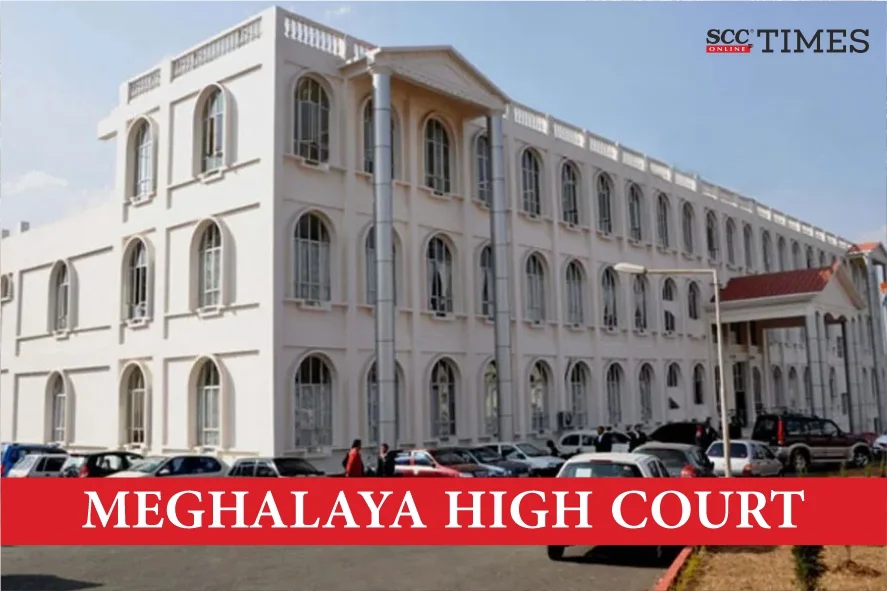Meghalaya High Court: In an intra-court appeal by a 5th semester student at Shillong Law College, pursuing an LL.B. course, against the decision barring him from taking the examination due to shortage of attendance on account of gallbladder illness, the Division Bench of IP Mukerji, CJ and W. Diengdoh, J. allowed the appeal and set aside the impugned decision.
The Court reiterated that Rule 12 could only cover a situation where in normal circumstances a student is absent, and his attendance falls below 70 per cent. However, the administrators of the college are to consider each case on its own merit. If they find that with the existing attendance the student has shown sufficient interest in and has adequate knowledge of the subjects in the semester and is otherwise diligent and of good conduct, he should be allowed to write the examination.
Background
In the present case, the appellant-student was barred from appearing in the 5th semester examination conducted in December 2024, on the ground that he had failed to meet the mandatory attendance requirement. As per Rule 12 of the Rules of Legal Education, 2008, (‘the Rules’) framed by the Bar Council of India, a student is required to maintain a minimum of 70% attendance in each subject to be eligible to appear for the end-semester examination. The Rule further vests a limited discretionary power in the Dean of the University to condone attendance up to 65%.
The student’s recorded attendance was 60%, which fell short of both the 70% minimum and the 65% discretionary threshold. He submitted that the shortfall in attendance was due to a gallbladder ailment, followed by surgical intervention and recovery, which took place in November 2024. A writ petition filed by him before the Single Judge challenging the decision of the University was dismissed, who upheld the application of Rule 12.
Aggrieved by the said order, the student preferred an intra-court appeal. Vide an interim order dated 05-12-2024, the Bench allowed the student to take the examination without prejudice to the rights and contentions of the parties in the appeal.
The Court provided the following prima facie reasoning in support of its interim relief:
“Prima facie we are of the view that this rule is to be interpreted reasonably. When it is possible for the student to attend classes and he deliberately or negligently does not do so, the rule would apply. In case of impossibility created by illness, act of God etc., this rule is either not to be applied or to be liberally construed, so that taking into account the overall performance of the student and his conduct, his case for being allowed to write the examination is compassionately considered.”
The Division Bench further directed the respondents to complete all necessary formalities and allowed him to sit for the examination.
Decision
The Court took note of the respondent’s acknowledgment that the student is a diligent and meritorious student. It was also noted that the student began experiencing a gallbladder-related ailment in August 2024, resulting in intense pain and a significant drop in attendance during that month. However, in September 2024, his health improved considerably, and his attendance record reflected the same—being 100% in subjects such as Evidence, Civil Procedure Code, Labour Law, and Drafting, Pleadings and Conveyancing, and 85.71% in Human Rights, averaging to 97%.
The Court pointed out that unfortunately, his health deteriorated again in October 2024, leading to a decline in attendance.
Affirming the prima facie observations made in the interim order dated 05-12-2024, the Court reiterated that Rule 12 of the Rules, while mandatory in ordinary circumstances, does not cover extraordinary situations such as serious illness, bereavement, natural disasters, civil disturbances, or other acts of God, which may reasonably prevent a student from attending classes. The Court emphasized:
“The administrators of the college are to consider each case on its own merit. If they find that with the existing attendance the student has shown sufficient interest in and has adequate knowledge of the subjects in the semester and is otherwise diligent and of good conduct, he should be allowed to write the examination.”
In the present case, the Court was of the view that, but for the illness, the student would have fulfilled the attendance requirement and demonstrated the necessary academic engagement and conduct.
Consequently, the Court directed that the student’s attendance be treated as regular, and that he be assessed in the 5th semester examination in the ordinary course, without any disqualification on account of attendance shortage.
[Bamang Nabam v. North Eastern Hill University, 2025 SCC OnLine Megh 399, Decided on: 06-05-2025]
Advocates who appeared in this case :
For the Appellant: Mr. P. Yobin, Adv; Ms. I. Laloo, Adv; Mr. A. Dkhar, Adv
For the Respondent: Mr. S. Sen, Adv; Ms. E. Blah, Adv; Mr. S. Chakrawarty, Sr.Adv; Mr. E. Laloo, Adv


